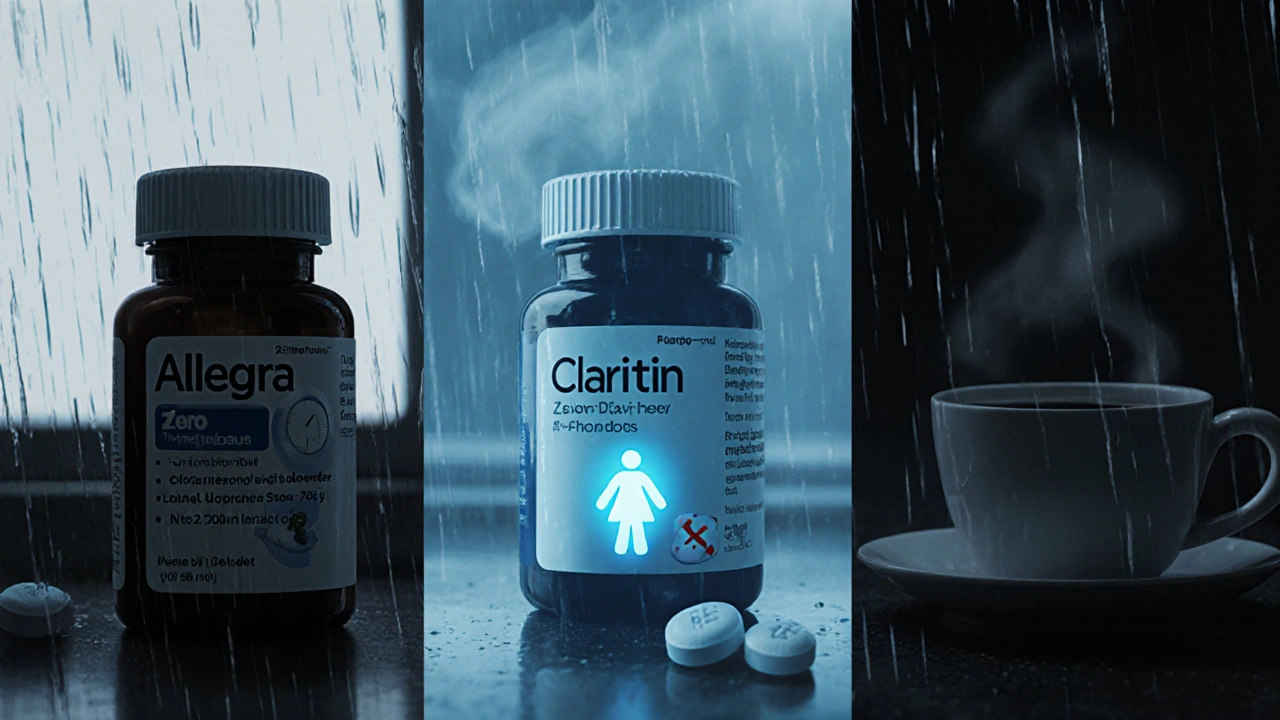Allergy Medication Selector
Which allergy symptoms do you experience?
Select all that apply. Your choices will help determine the most effective medication for you.
Runny nose, blocked sinuses, difficulty breathing through nose
Redness, itching, excessive tearing
Frequent, uncontrollable sneezing episodes
Must stay alert at work, driving, or while operating machinery
Looking for the most affordable OTC option
Recommended Allergy Medication
When your nose runs, your eyes itch, and you can’t tell if it’s a cold or just allergies, you want relief-fast. Allegra (fexofenadine) is one of the most common choices, but it’s not the only one. If you’ve ever wondered whether Claritin, Zyrtec, or even generic fexofenadine is better, you’re not alone. Let’s break down how Allegra stacks up against other allergy meds, what actually works, and which one might be right for you-no fluff, no marketing, just facts based on how people actually use them.
What is Allegra (fexofenadine)?
Allegra is the brand name for fexofenadine is a second-generation antihistamine that blocks histamine, the chemical your body releases during an allergic reaction. It was first approved by the FDA in 1996 and became available over-the-counter in the U.S. in 2011. Unlike older antihistamines like diphenhydramine (Benadryl), fexofenadine doesn’t cross the blood-brain barrier easily, so it rarely causes drowsiness.
It’s used for seasonal allergic rhinitis (hay fever), chronic hives, and other allergic skin reactions. Most people take one 60 mg tablet once a day, or 180 mg once daily for more severe symptoms. It starts working within an hour and lasts up to 24 hours. That’s why it’s popular among people who need all-day relief without feeling sluggish.
How does Allegra compare to Claritin (loratadine)?
Claritin (loratadine) is another second-generation antihistamine, and it’s often the first alternative people think of when comparing to Allegra. Both are non-sedating, available over-the-counter, and taken once daily. But here’s where they differ:
- Onset of action: Claritin takes about 1-3 hours to kick in. Allegra works in about 1 hour.
- Effectiveness: A 2017 study in the Journal of Allergy and Clinical Immunology found that fexofenadine provided slightly better symptom relief for nasal congestion than loratadine in patients with seasonal allergies.
- Food interaction: Claritin can be taken with or without food. Allegra’s absorption drops by up to 40% if taken with fruit juice (especially orange, grapefruit, or apple juice). Always take it with water.
- Generic availability: Both have generic versions. Generic loratadine is often cheaper than generic fexofenadine, but prices vary by pharmacy.
If you’ve tried Claritin and still feel stuffy or itchy, switching to Allegra might make a difference. But if Claritin works fine for you, there’s no urgent need to switch.
What about Zyrtec (cetirizine)?
Zyrtec (cetirizine) is also a second-generation antihistamine, but it’s a bit more potent-and more likely to cause drowsiness. About 1 in 5 people report feeling sleepy after taking Zyrtec, compared to less than 5% with Allegra.
- Speed: Zyrtec starts working in about 20 minutes, faster than both Allegra and Claritin.
- Strength: It’s often preferred for more intense allergy symptoms, like severe hives or itchy eyes.
- Side effects: Besides drowsiness, Zyrtec can cause dry mouth, fatigue, and occasional headaches. Allegra is gentler on the nervous system.
People who work in high-focus jobs-teachers, drivers, office workers-often choose Allegra over Zyrtec because of the lower risk of sedation. But if you’re not sensitive to drowsiness and need fast, strong relief, Zyrtec might be your best bet.
Is generic fexofenadine the same as Allegra?
Yes. Generic fexofenadine is chemically identical to the brand-name Allegra. The FDA requires generics to have the same active ingredient, strength, dosage form, and bioavailability as the brand. That means the pills work the same way, in the same amount of time.
The only differences are in the inactive ingredients (fillers, dyes, coatings), which rarely matter unless you have a rare allergy to something like FD&C yellow dye. Most people won’t notice a difference in effectiveness or side effects.
Here’s the real win: Generic fexofenadine can cost as little as $5 for a 30-day supply at pharmacies like Walmart or Costco, compared to $30-$40 for the brand. If you’re paying out of pocket, switching to generic saves you money with zero trade-off in results.

What about nasal sprays and eye drops?
Allegra is a pill. But allergies don’t just affect your throat-they hit your nose and eyes too. That’s why many people combine oral meds with targeted treatments.
- Nasal sprays: Flonase (fluticasone) and Nasacort (triamcinolone) are steroid sprays that reduce inflammation in the nasal passages. They take a few days to work but are more effective than pills alone for congestion.
- Eye drops: Ketotifen (Zaditor) or olopatadine (Patanol) relieve itchy, red eyes better than oral antihistamines.
Many people use Allegra for overall relief and add a nasal spray for stubborn congestion. This combo approach is common in allergy clinics and often more effective than relying on one type of medication.
Are there natural alternatives?
Some people turn to quercetin, butterbur, or local honey hoping for allergy relief. But here’s the truth: there’s no strong scientific evidence that any natural remedy matches the effectiveness of FDA-approved antihistamines.
One 2022 review in Frontiers in Immunology found that while quercetin showed mild antihistamine effects in lab studies, human trials were too small and poorly controlled to recommend it over medication. Butterbur has shown some promise in small studies, but it carries liver toxicity risks if not properly processed.
Local honey? It doesn’t work. A 2002 study published in the Annals of Allergy, Asthma & Immunology found no difference in allergy symptoms between people who ate local honey and those who didn’t. The pollen in honey isn’t the same type that causes seasonal allergies.
Don’t waste money on unproven supplements. Stick with what’s been tested and approved.
Who should avoid Allegra?
Allegra is safe for most adults and children over 6. But it’s not for everyone.
- People with kidney problems: Fexofenadine is cleared by the kidneys. If you have reduced kidney function, your doctor may lower your dose.
- Those taking certain antibiotics: Erythromycin and ketoconazole can increase fexofenadine levels in the blood, raising the risk of side effects.
- People who drink grapefruit juice regularly: As mentioned, juice interferes with absorption. Stick to water.
If you’re on other medications, always check with a pharmacist before starting Allegra. Most drug interactions are rare, but they’re avoidable with a quick check.

Which one should you choose?
Here’s a simple decision guide based on your needs:
| What you need | Best choice | Why |
|---|---|---|
| Fastest relief | Zyrtec | Starts working in 20 minutes |
| Zero drowsiness | Allegra | Lowest risk of sedation among OTC antihistamines |
| Lowest cost | Generic fexofenadine or loratadine | Often under $5/month at discount pharmacies |
| Bad nasal congestion | Allegra + Flonase | Combination tackles both histamine and inflammation |
| Itchy eyes | Zyrtec + eye drops | Oral + topical works better than either alone |
Most people find one of these options works well. If the first one doesn’t, try another. Allergies are personal-what works for your neighbor might not work for you.
What if nothing seems to work?
If you’ve tried Allegra, Zyrtec, Claritin, nasal sprays, and eye drops-and you’re still struggling-you might need to look beyond antihistamines.
- Are you avoiding allergens? Use HEPA filters, wash bedding weekly in hot water, and keep windows closed during high pollen days.
- Have you been tested for specific allergies? Allergy testing can pinpoint what’s triggering you-maybe it’s mold, dust mites, or pet dander you haven’t identified.
- Could it be non-allergic rhinitis? Some people have chronic nasal symptoms without true allergies. That requires different treatment.
See an allergist if your symptoms last more than a few weeks, interfere with sleep or work, or don’t respond to OTC meds. There are other options, like immunotherapy (allergy shots or tablets), that can change how your body reacts long-term.
Can I take Allegra every day?
Yes. Allegra is approved for daily use during allergy season. Many people take it every day from late winter through summer without issues. Long-term studies show it’s safe for up to a year or more. Always follow the dosage on the label unless your doctor says otherwise.
Does Allegra help with pet allergies?
Yes. Allegra blocks histamine, which is released when you’re exposed to pet dander. It helps reduce sneezing, runny nose, and itchy eyes caused by cats, dogs, or other animals. But it won’t stop the dander itself. For best results, combine it with regular cleaning and air filters.
Is Allegra better than Benadryl?
For most people, yes. Benadryl (diphenhydramine) works fast but causes strong drowsiness and only lasts 4-6 hours. You’d need to take it 3-4 times a day. Allegra lasts 24 hours and doesn’t make you sleepy. Use Benadryl only for sudden, severe reactions or if you can’t tolerate other options.
Can children take Allegra?
Yes. Allegra is approved for children as young as 2 years old, but dosing is weight-based. Children 2-11 years old typically take 30 mg twice daily. Always check with a pediatrician before giving any allergy medicine to a child.
Does Allegra cause weight gain?
No. Unlike some older antihistamines or steroid medications, fexofenadine has no known link to weight gain. Studies tracking users for up to a year found no significant change in body weight compared to placebo.
Final thoughts
Allegra isn’t the strongest antihistamine, but it’s one of the cleanest. If you need reliable, non-drowsy relief that lasts all day, it’s a top choice. But if you need faster action or stronger symptom control, Zyrtec might be better. If cost is your biggest concern, go generic. And if one pill isn’t enough, combine it with a nasal spray or eye drops.
Allergy meds aren’t one-size-fits-all. Try one, give it a week, then adjust if needed. Your body will tell you what works.

8 Comments
Jackie R October 31 2025
Anyone who takes Zyrtec is just lazy. If you can’t handle a non-drowsy option, maybe you shouldn’t be driving or operating machinery. Allegra is the only real choice for adults who want to function. Generic fexofenadine? $5. Done. Stop wasting money on hype.
And no, local honey doesn’t work. That’s a myth pushed by people who don’t understand immunology. Grow up.
Josh Arce October 31 2025
bro allegra is just a fancy word for nothing. i tried it. still sneezed. zyrtec made me nap but at least i stopped crying. also why do people act like generic is magic? it’s the same pill in a different bag. why pay more for the brand? because marketing.
also flonase is a steroid. that’s scary. i’m not putting chemicals in my nose. i just want to breathe.
Eli Grinvald November 2 2025
Thank you for this so much 🙏 I’ve been using Allegra for years but never knew about the juice thing 😳 I was drinking orange juice with my pill every morning… no wonder it felt weak sometimes. Switched to water and boom - whole different experience. Also, combining it with Zaditor for my eyes? Game changer. 🌸
And yes, generic fexofenadine is literally the same. I buy it at Costco. $4.99. I’m not a scientist but I know what works.
Also, if you’re still itchy after meds… try cotton sheets. Synthetic fabrics are the worst. Just saying.
Alexis Hernandez November 2 2025
Look, allergies are weird. My buddy swears by Zyrtec, I’m all about Allegra, and my mom still uses Benadryl like it’s 1998. All of you are right in your own way.
But here’s the real secret - it’s not about the pill. It’s about your environment. I used to suffer like crazy until I got a HEPA filter, washed my sheets weekly, and stopped letting my dog sleep on the bed. The meds help, sure. But if you’re breathing in pollen like it’s air freshener, no drug’s gonna fix that.
Also, kids under 2? Don’t guess. Talk to the doc. I learned that the hard way.
And yeah, honey? Nah. That’s like drinking paint because it’s ‘natural.’
Just chill. Try one thing. Wait a week. If it sucks, try another. Your nose will thank you.
brajagopal debbarma November 3 2025
USA people always think their pills are the best. In India, we just use salt water rinse and call it a day. No pills. No fuss. No $40 monthly bills.
Also, why are you all arguing about Zyrtec vs Allegra? Just go outside less. Stop being so soft. My grandpa had allergies since 1950 and never took one pill. He just held his nose and walked.
Carly Smith November 5 2025
Why is everyone so obsessed with pills? You’re all just ignoring the real problem - pollution. The air is toxic. You think a $5 pill fixes that? No. You need to move to the mountains. Or stop being lazy and clean your house.
Also, flonase is fine if you’re not a coward. And yes, I’ve used it for 5 years. No side effects. Just clean sinuses.
And local honey? Please. That’s the kind of nonsense people believe because they want to feel like they’re doing something. You’re not a witch. You’re just allergic. Take the medicine.
Also, why is everyone on Reddit acting like they’re allergists? You read one article and now you’re an expert? Lol.
Kurt Stallings November 6 2025
Allegra is a corporate placebo wrapped in FDA approval. The real solution is avoiding allergens entirely - which requires lifestyle abandonment most aren’t brave enough for.
Generic? Of course it’s the same. But so is tap water and bottled water. The branding is the product.
And Zyrtec? It’s not about drowsiness. It’s about surrendering to the chemical. I’d rather suffer than submit.
Flonase? Fine. But it’s still suppression. Not healing.
Also, honey? You’re missing the point. It’s not about pollen. It’s about terroir. The land remembers. Your body forgets.
End of discussion.
Angie Creed November 7 2025
Let’s be honest - this entire thread is a performance of medical virtue signaling. You all think you’re ‘doing the research,’ but you’re just consuming content like it’s gospel.
Allegra isn’t ‘better’ - it’s just the one that doesn’t make you feel like a zombie. Zyrtec isn’t ‘stronger’ - it’s just the one that makes you admit you’re vulnerable. And generics? They’re the last refuge of the economically anxious pretending they’re frugal.
And yet - none of you have asked the real question: Why are we so allergic in the first place? Is it the food? The air? The Wi-Fi? The loneliness?
We treat symptoms like criminals - we arrest them, we don’t interrogate them.
So yes, take your pills. But ask yourself - are you healing? Or just hiding?
And yes - I know the study from Frontiers in Immunology. I read it in the original French. You didn’t. You read a Reddit summary.
And no - I’m not taking Zyrtec. I’m taking silence. And that’s the only antihistamine that works.
Also - honey? It’s not about pollen. It’s about intention. You can’t medicate your soul.
Final thought: If your allergies are worse than your purpose - maybe it’s time to reevaluate your life.